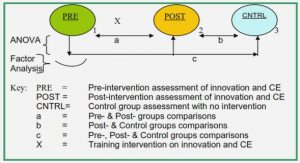Get Complete Project Material File(s) Now! »
Chapter Three: Thematic Analysis
This chapter presents the thematic analysis of the positive experiences of relationships with stepmothers. As discussed previously, the interview data were classified into two sets: positive experiences of the stepmother-stepchild relationship and difficult experiences of the stepmother-stepchild relationship. Eight themes emerged from the two sets of data. Participants’ positive experiences were represented according to four themes: 1) ways in which participants felt supported by their stepmother; 2) participants’ experiences of positive qualities of their stepmother, 3) ways in which participants felt that their stepmother contributed to a sense of family; and 4) ways in which participants felt that their stepmother showed appropriate respect for the existing family. In some cases, the overall theme contained a few sub-themes, which are also discussed. The difficult experiences are discussed in Chapter Four.
In the following section, the main themes are discussed along with the number of participants who talked about each theme and quotes illustrating examples of the theme. Table 2 contains an overview of the themes and sub-themes.
Positive themes
This section presents an analysis of the positive data. The positive experiences were grouped according to the following four themes:
(1) Felt supported
(2) Stepmother qualities
(3) Contributed to a sense of family
(4) Respected existing family members
All twenty-five participants made at least one positive statement about the stepmother. Overall, three participants experienced a mostly positive relationship with the stepmother, 18 participants experienced a mixture of both positive and difficult periods in the relationship, and four participants had a mainly negative relationship with the stepmother with few positive experiences.
Felt supported
Nearly all participants (n = 24) talked about receiving at least some support from the stepmother. Five participants talked about receiving a lot of support, four participants thought they received some and fifteen participants said they received little support. Of the latter, three talked, during the interview, about only one instance of receiving support from the stepmother.
Emotional support
Emotionally supportive experiences identified by participants consisted of feeling cared about, being able to discuss problems and get advice, and being able to talk openly with the stepmother. Thirteen participants referred to some memories of feeling cared about or loved by the stepmother. They talked about how important it had been to them to receive physical affection, to be given attention, to be comforted when upset and to be treated by the stepmother as if they were one of her own children. Displays of physical affection included such things as spontaneous soothing and hugs, or a kiss when saying hello or goodbye. One participant remembered being surprised by her stepmother’s display of affection, which resulted in her being more open to developing a closer relationship with her, I remember one time I got up in the middle of the night and I fainted in the bathroom, and apparently I had a seizure. And she was the one that got me up and got me back to bed and looked after me for that day. That was nice. I think I was a little bit surprised. After that I felt warmer towards her … After that I thought she actually does care (P19).
One participant who lived full-time with his father talked about being appreciative of what he saw as his stepmother’s “motherly” warmth and support; his own mother had been hospitalised when he was a pre-schooler so support from her was limited, I do remember hugs and plenty of warmth … She always wanted the best for me … Yeah she really did care when it was hard for me … She visited me when I was in hospital—she was always there with Dad … She was always a good person towards me, a good parent (P10).
Another participant who met her stepmother when she was a pre-schooler recounted her experience of feeling loved by her stepmother and her appreciation of the stepmother’s attention, I really appreciated the attention my stepmum gave to me, because my mum was working full-time so couldn’t pay all of her attention to me (P23).
Another participant who described a mostly negative relationship with his stepmother was able to acknowledge a few times when he thought his stepmother was supportive, She was really good—had compassion for me when I was having trouble at school, just being really kind and settled me down and she actually boosted me in a way (P2).
Participants also recalled positive experiences related to their sense that communication between themselves and their stepmothers was becoming more open and honest over time. A few participants said that as time went by the stepmother became more open about herself and her history and that this led to a deepening of understanding and increased closeness in the relationship. It also led them to be more trusting of her and to open up more themselves. One participant discussed how in recent years her stepmother has been more open with her, and how this had helped her make sense of some of the early difficult experiences in the relationship, My stepmum was very open to me—she didn’t seem closed off and she was happy to talk about things—family questions that I wanted to ask. I felt comfortable telling her things … And she opened up a lot to me as well and she talked about having post natal depression and being on IVF. So I realised that they were huge factors in our relationship early on … and we definitely opened up more on an emotional level (P18).
Another participant appreciated what she perceived as her stepmother’s approachability and openness when it came to discussing difficulties in their relationship, Yeah, that’s definitely one of the awesome aspects of our relationship is that we are able to, you know, say I understand where you’re coming from, I’m sorry, and kind of work things out … Because we both have personalities where we’re willing to look at all sides of a situation and accept that what we think is maybe not what the other person thinks but that there can be multiple right sides to a story (P16).
Participants also said they valued being able to talk through problems or get advice from the stepmother. Several participants found it valuable to have an independent adult they could talk to about issues they would not discuss with a parent. One told a story about her stepmother’s reaction to a drunken party, I guess it’s slightly embarrassing stuff like one of my friends had way too much to drink. We were all a little bit drunk and she threw up and my stepmother heard her throwing up and she was kind of annoyed but she was really good about it. Whereas, I don’t think Dad would have been … Like she’s not my mother … You don’t have to project a false image … Yeah she’s not sort of responsible—well, she is, but not in the same way (P1).
The above participant’s experience suggests she thought she could be more honest with her stepmother about some of her teenage experiences than with her parents.
Another participant also appreciated how she was able to look to her stepmother for emotional support in matters that she couldn’t take to her own mother, Well it was great that I had another person to talk to … Just having someone else for support—someone that is going to help me think through things. Sometimes there are things that you can’t talk to your mum about, so you want to talk to somebody else (P25).
Several of the female participants appreciated having the stepmother around to help with ‘girl’ issues. This included helping them with things like clothes and make-up but also helping when they menstruated. Two participants recalled the input from the stepmother, If we were going out she would always do my hair and my makeup and make me look pretty. Yeah, that was nice too (P14).
I mean because living with Dad—obviously, he’s male, and I was the eldest— and I’m like, a girl, so he didn’t really know what to do with me. And I was quite early developed for my age. I mean I wasn’t going to go and ask Dad and say Dad I think I need to buy my first bra. Whereas, it was good to have my stepmum there to be able to talk to. And you know when I first got my period it was my stepmum that was there (P20).
Some participants came to see their stepmother as a friend and, for three participants their stepmother came, over time, to fill the role of their absent mothers. The following participant talked about her stepmother becoming more like a friend in recent years, I think as I’ve gotten older, we’ve got closer. I would say it’s quite a close supportive relationship now. I wouldn’t say that I am a daughter figure to her but it’s becoming more like a friendship … I would say I’m closer to her than I am with my real mother. I feel supported by her and she doesn’t get judgmental. Yeah and we have alone times as well, just her and me. Like our relationship has developed more just the two of us (P9).
Another participant discussed how she sees the stepmother’s role as equal to that of a parent, I mean I call her Mum. And when I’m talking about my parents, I’m talking about her as well. I mean technically she’s not my parent, but she’s married to my dad—she supports me in the way that Dad does—like so technically she is my parent. I mean like I’ve got my mum and my dad and she’s my stepmum. They are all my parents (P20).
Two participants, who lived with their father and stepmother full-time because of the mother being unwell, recounted their experience of having a stepmother that fulfilled the mother role, I guess part of it, in a sense, was to fill the role of a mother to me because my mother couldn’t fulfil it anymore, unfortunately, with her illness … I’m really thankful for that. Two parents keeping up the upbringing … A real stepmother that does actually love you and care for you—what more can you ask for in a parent, really (P10)?
I always saw her as my mum. And she came with me on my first day of school— my stepmum did—so she kind of took the mother’s role. So like she was just mum to me … She kind of just did everything ‘cause we lived with her and she treated us like we were her own. So it was good … I used to call them ‘Mummy Debra’ and ‘Mummy Katherine’ (P24).
The following participant’s mother died when she was a teenager, and initially the relationship with the stepmother was experienced as rather awkward and at times conflictive. However, on reflection the participant was appreciative of her stepmother’s perseverance in building a relationship with her after the loss of her mother. From her late teens until the present the participant has continued to build a very strong, positive and supportive relationship with her stepmother, I remember sitting in the front row at the funeral. I was sitting next to my dad and my sister and she was on the other side. And I was crying and she was like rubbing my back from behind my dad … And she bought us roses … At first we had an awkward relationship and then we had a very angry one and didn’t get on at all. And now I would probably say that her and I are a lot closer than even my brother and myself or my dad and me—because she’s just like my mum now pretty much (P8).
Hence the participant’s stepmother helped her cope with the loss of her mother and also gave her the support of a mother figure.
The experiences and perceptions of the above four participants demonstrates that over time some stepchildren were willing to accept the stepmother playing a significant role in their lives. Receiving emotional support from the stepmother was a significant experience for some participants that led them to develop a positive relationship with her.
Practical support
Practical support was provided by stepmothers in various ways: by engaging in activities with stepchildren, helping with household tasks, getting them to appointments, helping them with their studies and by providing supplemental financial resources.
Participants recalled that they appreciated engaging in enjoyable activities with their stepmother. The following participant lived with her mother and visited her father for weekends and holidays for the first three years after her parents separated. She then lived with her father and stepmother full-time. This is how she remembered early visits with her stepmother, We would sometimes go out for brunch. Those were fun times. Plus, we were quite close to the beach so we could go swimming and my stepmother always wanted to do stuff—you know, not hang around home … Then, eventually they got a wee boat and we used to go out boating, go out to a beach … There were lots of cool things like that. We went to the museum a couple of times, which was pretty cool. It was like lots of little adventures (P19).
Chapter One: Literature Review
Brief overview of study
Definition of terms
Why study stepfamilies?
The number of stepfamily households
Outcomes for children in stepfamilies
Stepfamily characteristics and functioning
Stepparent role
Stepmother role
Stepchildren’s experiences of stepfamilies
Stepchildren’s experiences of stepparent-stepchild relationships
Stepchildren’s experiences of relationships with stepmothers
Conclusion
Chapter Two: Qualitative Research Methodology
Qualitative methodology of this study
Method
Participant recruitment
Participants
Data collection
Data analysis
Validity of the research
Chapter Three: Thematic Analysis
Positive themes
Felt supported
Stepmother qualities
Contributed to sense of family
Respected existing family members
Chapter Four: Thematic Analysis
Difficult experiences
Discipline and rules
Personality
Disrupted relationship with the father
Torn loyalties
Chapter Five: Plot Analysis of Graphs
Change in relationship over time
Relationship development over time
Positive inclines, declines and turning points
Summary
Chapter Six: Discussion
Development of stepmother-stepchild relationships over time
Experiences affecting relationships with stepmothers
Relationships with stepmothers and stepmothers role
Relationships in the stepfamily
Influences of the stepchild
Clinical implications
Limitations
Directions for future research
Conclusion
References
Appendices
GET THE COMPLETE PROJECT






